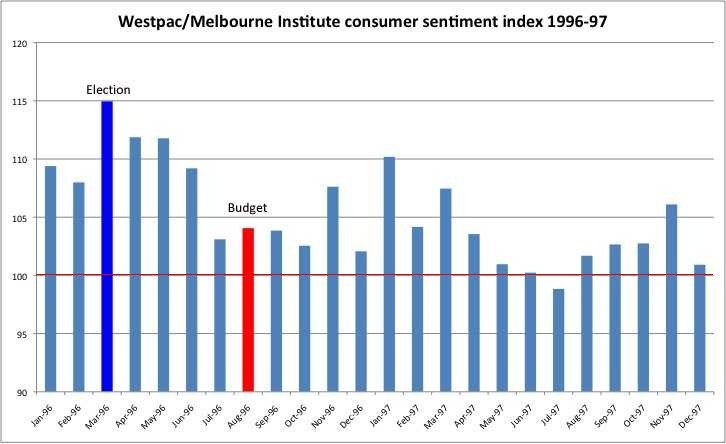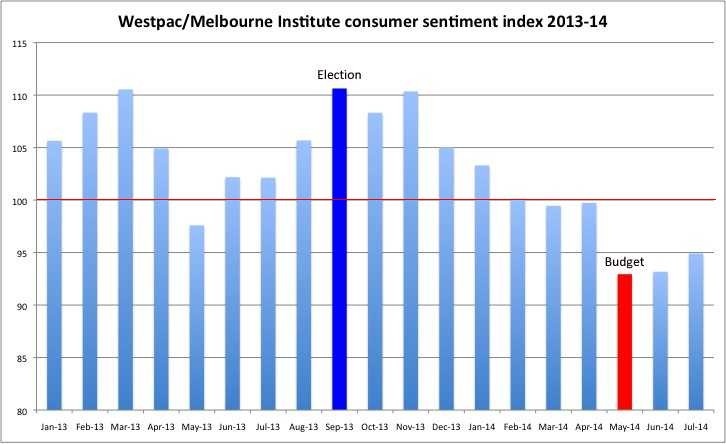Howard shines a light on a bungled budget
Following the good news on Monday that the ANZ-Roy Morgan consumer confidence index had rebounded to pre-budget levels, on Wednesday we also saw US consumer confidence hit its highest level since October 2007.
Happy days. It's almost as if the GFC never happened.
Well, not quite. Behind the buoyant ANZ-Roy Morgan figures is the darker fact that Australian sentiment is still at pretty gloomy levels by historical standards.
The other commonly quoted index of consumer sentiment, jointly compiled by Westpac and the Melbourne Institute, tells a different story.
The charts below show the impact of two elections and two first budgets: Howard/Costello in 1996 and Abbott/Hockey in 2013/14.
To read these charts correctly, it's important to note that this index is not just a relative measure of sentiment over time, but also includes a net measure of optimism and pessimism.
When the index is over 100, optimists outnumber pessimists across "five component indexes which reflect consumers' evaluations of their household financial situation over the past year and the coming year, anticipated economic conditions over the coming year and the next five years, and buying conditions for major household items".
Below 100, pessimists rule.


Back in 1996, Howard and Costello gave themselves five months to sort out the 'fiscal black hole' bequeathed to them by outgoing Labor treasurer Ralph Willis. As described previously (Expect a budget full of transparent fudging, April 30), it was an epic task for Peter Costello who, at the same time, created the Charter of Budget Honesty Act to stop the Willis trick from being played again.
Costello slashed $8 billion from the budget over two years and faced a wall of criticism from the Kim Beazley-led opposition and riots from the unions.
One might have expected consumer confidence to plummet, but two factors held it up.
Firstly, the Reserve Bank began a rate-cutting spree that slashed the cash rate from 7 per cent to 5 per cent in the space of a year.
Secondly, the union movement scored a historic own goal by smashing in the doors of Parliament House and terrorising politicians, who were forced by security guards to remain locked in their offices for hours.
When footage of the extraordinary display hit the evening news, Labor's opportunity to punish Costello for 'savage cuts' to spending vanished overnight.
Public opinion swung behind Howard and Costello, and the sharp fiscal consolidation of 1996/97 did not push the Westpac-Melbourne Institute index below the 100 mark. (The following budget did, though only for one month.)
It seems almost funny now, but at the time Howard and Costello were castigated by the press for bungling the selling of the 1996 budget.
The Australian Financial Review, for instance, did not mince its words: "From ATSIC cuts, to the diesel fuel rebate, to the ABC, departmental cuts and university funding. Just about every issue you can think of has been managed with an almost total lack of political astuteness.
"The government has been unable to present its austerity measures as part of a wider policy agenda, giving the appearance that it doesn’t have one. Any program that does exist lacks real coherence ... grafted onto a moderate Fightback is Howard's pedestrian vision of ‘comfortable and relaxed’ Australians..."
The truth is that Australians were comfortable and relaxed in 1996 compared with levels of consumer sentiment today.
Both governments attempted to diffuse the 'sticker shock' of harsh budgets by trickling the nasties out through a series of leaks ahead of budget day. The difference, in retrospect, is that the plan worked for Howard and Costello.
This time around, the pre-budget leaks and the actual budget itself have had an excoriating effect on consumer sentiment. If it is 'rebounding' -- and we should hope it is -- it has a way to go before we're out of the woods.
















